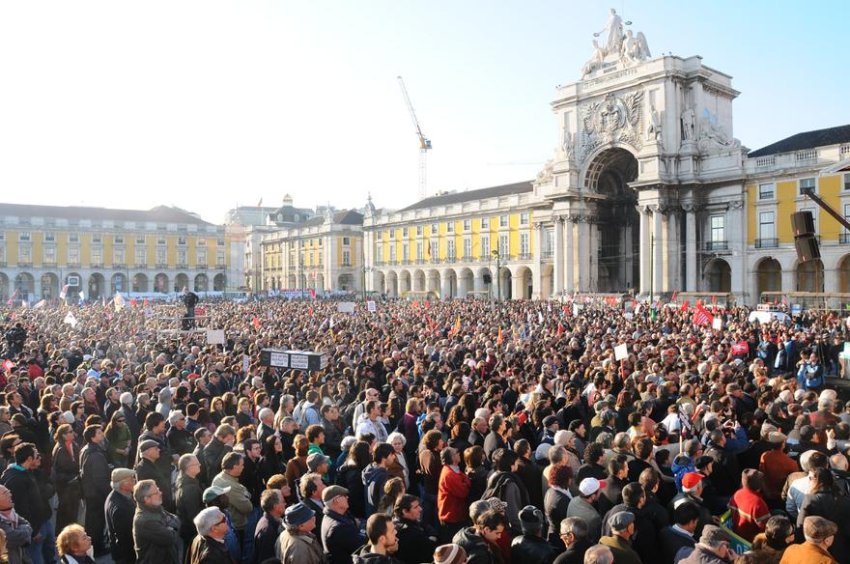
Lisbon's vast Palace Square became People's Square on February 12. More than 300,000 workers, young people, unemployed and pensioners from across Portugal marched to voice their rejection of cutbacks inflicted by Prime Minister Pedro Passos Coelho's government.
It was the country's biggest demonstration in 30 years.
Photo slide shows of the mass march can be seen here and here
Since winning elections last June, Passos Coelho, leader of the conservative Social Democratic Party (PSD), has diligently implemented the "rescue package" for Portugal imposed by the "troika" of the European Union, European Central Bank and International Monetary Fund.
The result has been entirely predictable -- growth is in a nosedive (-2.7% for 2011), official unemployment is at its highest since statistics began (13.6% in December), and over a quarter of the population live in poverty.
The revolt is not (yet) as dramatic as in Greece, but the huge turnout for the demonstration showed anger is rapidly growing.
The specific policy that helped fill Palace Square to overflowing was the government's "labour market reform", which will lengthen the working day, and entrench casualisation and lower wages.
Video: Manifestação de 11 Fevereiro - YouTube/EP Formiga.
The demonstration was called by the Portuguese General Confederation of Labour (CGTP). Its newly elected general secretary Armenio Carlos told the crowd: "The Portuguese people have filled Palace Square to tell the government and the employer organisations that here there'll be no surrender."
Carlos called for growth policies and debt renegotiation.
He took the opportunity to answer foreign affairs minister Paolo Portas, who has described this increasingly popular idea as sending a "swindler's message" to the international community.
Carlos said: "The swindler isn't the person who demands debt renegotiation in order to create wealth and jobs and the conditions for paying back what is owed. The swindler is the person who surrenders, who accepts what is imposed, even while aware that under present conditions what is owed can never be paid back."
Two days after the huge rally, Olli Rehn, the European commissioner for economic affairs, was moved to comment: "I know that Portugal and the Portuguese have to face great challenges, but it is important that the country continue to show political unity."
The CGTP has called its next national demonstration for March 31. It is also supporting the February 29 Day of European Struggle, which will take place under the slogan "Against austerity, exploitation and poverty -- for jobs, wages, workers rights and public services".
[Dick Nichols is Green Left's European correspondent, based in Barcelona.]